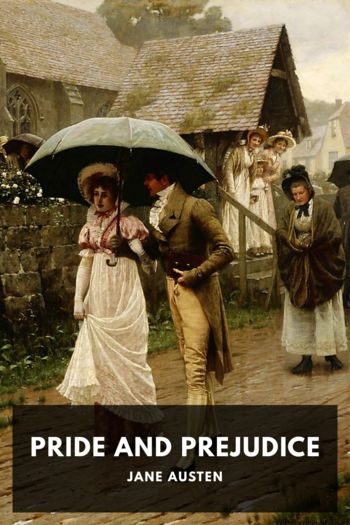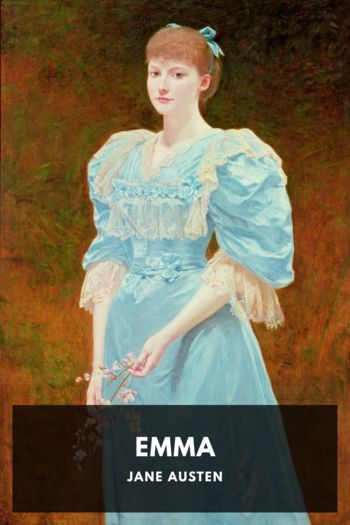Pride and Prejudice by Jane Austen (best ereader for students txt) 📕

- Author: Jane Austen
Book online «Pride and Prejudice by Jane Austen (best ereader for students txt) 📕». Author Jane Austen
The communication excited many professions of concern; and enough was said of wishing them to stay at least till the following day to work on Jane; and till the morrow, their going was deferred. Miss Bingley was then sorry that she had proposed the delay, for her jealousy and dislike of one sister much exceeded her affection for the other.
The master of the house heard with real sorrow that they were to go so soon, and repeatedly tried to persuade Miss Bennet that it would not be safe for her—that she was not enough recovered; but Jane was firm where she felt herself to be right.
To Mr. Darcy it was welcome intelligence—Elizabeth had been at Netherfield long enough. She attracted him more than he liked—and Miss Bingley was uncivil to her, and more teasing than usual to himself. He wisely resolved to be particularly careful that no sign of admiration should now escape him, nothing that could elevate her with the hope of influencing his felicity; sensible that if such an idea had been suggested, his behaviour during the last day must have material weight in confirming or crushing it. Steady to his purpose, he scarcely spoke ten words to her through the whole of Saturday, and though they were at one time left by themselves for half an hour, he adhered most conscientiously to his book, and would not even look at her.
On Sunday, after morning service, the separation, so agreeable to almost all, took place. Miss Bingley’s civility to Elizabeth increased at last very rapidly, as well as her affection for Jane; and when they parted, after assuring the latter of the pleasure it would always give her to see her either at Longbourn or Netherfield, and embracing her most tenderly, she even shook hands with the former. Elizabeth took leave of the whole party in the liveliest spirits.
They were not welcomed home very cordially by their mother. Mrs. Bennet wondered at their coming, and thought them very wrong to give so much trouble, and was sure Jane would have caught cold again. But their father, though very laconic in his expressions of pleasure, was really glad to see them; he had felt their importance in the family circle. The evening conversation, when they were all assembled, had lost much of its animation, and almost all its sense, by the absence of Jane and Elizabeth.
They found Mary, as usual, deep in the study of thorough bass and human nature; and had some new extracts to admire, and some new observations of threadbare morality to listen to. Catherine and Lydia had information for them of a different sort. Much had been done, and much had been said in the regiment since the preceding Wednesday; several of the officers had dined lately with their uncle, a private had been flogged, and it had actually been hinted that Colonel Forster was going to be married.
XIII“I hope, my dear,” said Mr. Bennet to his wife, as they were at breakfast the next morning, “that you have ordered a good dinner today, because I have reason to expect an addition to our family party.”
“Who do you mean, my dear? I know of nobody that is coming I am sure, unless Charlotte Lucas should happen to call in, and I hope my dinners are good enough for her. I do not believe she often sees such at home.”
“The person of whom I speak, is a gentleman and a stranger.” Mrs. Bennet’s eyes sparkled. “A gentleman and a stranger! It is Mr. Bingley I am sure. Why Jane—you never dropped a word of this; you sly thing! Well, I am sure I shall be extremely glad to see Mr. Bingley. But—good lord! how unlucky! there is not a bit of fish to be got today. Lydia, my love, ring the bell. I must speak to Hill, this moment.”
“It is not Mr. Bingley,” said her husband; “it is a person whom I never saw in the whole course of my life.”
This roused a general astonishment; and he had the pleasure of being eagerly questioned by his wife and five daughters at once.
After amusing himself some time with their curiosity, he thus explained. “About a month ago I received this letter, and about a fortnight ago I answered it, for I thought it a case of some delicacy, and requiring early attention. It is from my cousin, Mr. Collins, who, when I am dead, may turn you all out of this house as soon as he pleases.”
“Oh! my dear,” cried his wife, “I cannot bear to hear that mentioned. Pray do not talk of that odious man. I do think it is the hardest thing in the world, that your estate should be entailed away from your own children; and I am sure if I had been you, I should have tried long ago to do something or other about it.”
Jane and Elizabeth attempted to explain to her the nature of an entail. They had often attempted it before, but it was a subject on which Mrs. Bennet was beyond the reach of reason; and she continued to rail bitterly against the cruelty of settling an estate away from a family of five daughters, in favour of a man whom nobody cared anything about.
“It certainly is a most iniquitous affair,” said Mr. Bennet, “and nothing can clear Mr. Collins from the guilt of inheriting Longbourn. But if you will listen to his letter, you may perhaps be a little softened by his manner of expressing himself.”
“No, that I am sure I shall not; and I think it was very impertinent of him to write to you at all, and very hypocritical. I hate such false friends. Why could





Comments (0)